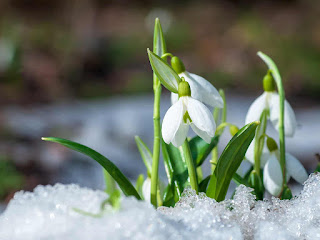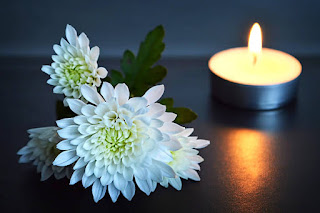A Sonnet by Malcom Guite: Candlemas
They came, as called,
according to the Law.
Though they were poor
and had to keep things simple,
They moved in grace, in
quietness, in awe,
For God was coming with
them to His temple.
Amidst the outer court’s
commercial bustle
They’d waited hours,
enduring shouts and shoves,
Buyers and
sellers, sensing one more hustle,
Had made a killing on
the two young doves.
They come at last with
us to Candlemas
And keep the day the
prophecies came true
We glimpse with them,
amidst our busyness,
The peace that Simeon
and Anna knew.
For Candlemas still
keeps His kindled light,
Against the dark our
Saviour’s face is bright.
The feast of
Candlemas that we celebrate today comes at a significant time in our country’s
struggle with the pandemic. On Tuesday we marked and passed the heartbreaking
number of one hundred thousand lives lost in this country and over two million worldwide.
‘Who can compute the sorrow?’ our Prime Minister asked, which, although an
unusual turn of phrase, as his vocabulary often is, focused attention on the
countless people who are also grieving loved ones who have died. I am not at
all sure that sorrow – or joy – can be computed, but I imagine that only a
computer could quantify the sheer human cost if it could somehow be assessed on
a spreadsheet of miserable graphs as on the “next slide please” brought forward
by the well-meaning Professor Chris Whitty.
Candlemas marks the
end of the season of Epiphany, this bittersweet celebration reflects on the sadness
and hope of the characters in the story. Anna had been a widow for over seventy
years, a long time to be alone and waiting – who can compute her sorrow? -
Simeon, also a great age patiently going to the temple, daily looking forward
to the Messiah; Mary for whom this would have been a great and joyful occasion
presenting her child to God in the temple, hearing how Jesus was destined to
cause division amongst his own people and to die. The hope of the season of
Epiphany and its revelation of the light of the world now turns towards the
road to the cross. The cross points through death to the hope of resurrection,
a glory yet to be known, good news for all people.
In the service the
blessing of candles or our lights in our houses expresses the hope of the light
of Christ permeating that darkness, overcoming death, suffering …


















































